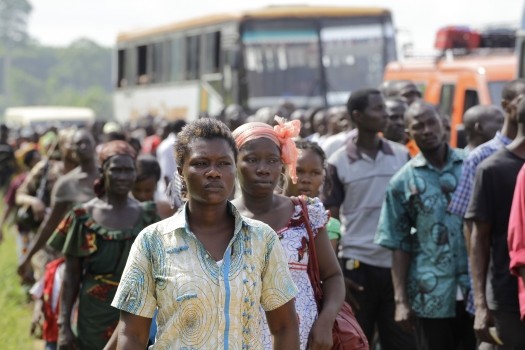In the wake of armed conflict or widespread violence, States should employ criminal accountability to hold perpetrators of serious crimes accountable for their actions, says a new report from the United Nations Special Rapporteur on the promotion of truth, justice, reparation and guarantees of non-recurrence.
In his presentation before the Human Rights Council earlier this month, UN Special Rapporteur Pablo de Greiff warned that “despite clear international obligations, only a fraction of perpetrators of massive violations are ever investigated and prosecuted”, and called on post-conflict States to pursue accountability for serious crimes by adopting comprehensive prosecutorial strategies in as part of larger transitional justice process.
De Greiff's report asserts prosecutions should be understood as a critical part of a comprehensive transitional justice policy, and emphasizes the duty to investigate and prosecute. It discusses in-depth how to create an effective prosecutorial prioritization strategy, and how such an approach can be designed so as to reflect the needs and justice demands of victims.
“Participation empowers victims and catalyses demands for justice,” said de Greiff.
The report is the second thematic report in a series devoted to each of the four areas of the Special Rapporteur's mandate.
Strategy and prioritization key to success
The report reminds that investigations and prosecutions of those responsible for conflict-era abuses can help rebuild civic trust in public institutions—a linchpin in the re-establishment of the rule of law. In his report, de Greiff affirms that effective criminal justice procedures that recognize victims as rights holders and, eventually, may even help lead to social reconciliation.
The report notes, however, that in many societies emerging from conflict, most of those responsible for crimes of the past are never tried, for reasons ranging from lack of resources, capacity or political will, the sheer number of perpetrators, and/or a regime's continued political power or influence. Many countries "opt out" of pursuing accountability, fearing the prosecution of former leaders could threaten the stability of a transitional government, or because of the sheer enormity of the task. Amnesties are of particular concern to de Greiff, who warns that by putting some people above the law, a culture of impunity can become entrenched.
In recognition of these deficiencies of justice, De Greiff's report explains how to create prosecutorial strategies and prioritization at the national level while at the same time containing risks.
De Greiff argues that prioritization strategies adapted to local contexts work to maximize the potential impact of prosecutions. A prioritization strategy, he explains, can best be understood as a "focalizing tool"--a framework that provides direction to investigations, prosecutorial efforts, and the allocation of resources.
An overarching strategy can identify patterns of crime and systemic violence, and strategies that maintain the prosecutorial focus on patterns of victimization may help protect a society’s most vulnerable groups. If prosecutorial strategies prioritize looking at the structures that allowed violations to occur in the first place, they can have the added benefit of dismantling those structures--thereby making the trial itself not an isolated event.
Also critical is communication and outreach to the public, says De Greiff, in order to keep any justice processes open and accessible to the public, and to explain, for example, why some cases are dealt with before others, or to manage expectations. Even the articulation of a strategy, de Greiff emphasizes, must involve dialogue and discussion from other sectors outside the legal system.
Read more here or download the report here.
Photo: People wait in lines to have their bags searched and ID documents checked by republican forces, as they take public transport for the country's interior one day after soldiers allied with Alassane Ouattara captured strongman Laurent Gbagbo, at a checkpoint 20km outside Abidjan, Ivory Coast, Tuesday, April 12, 2011 (AP Photo/Rebecca Blackwell)
